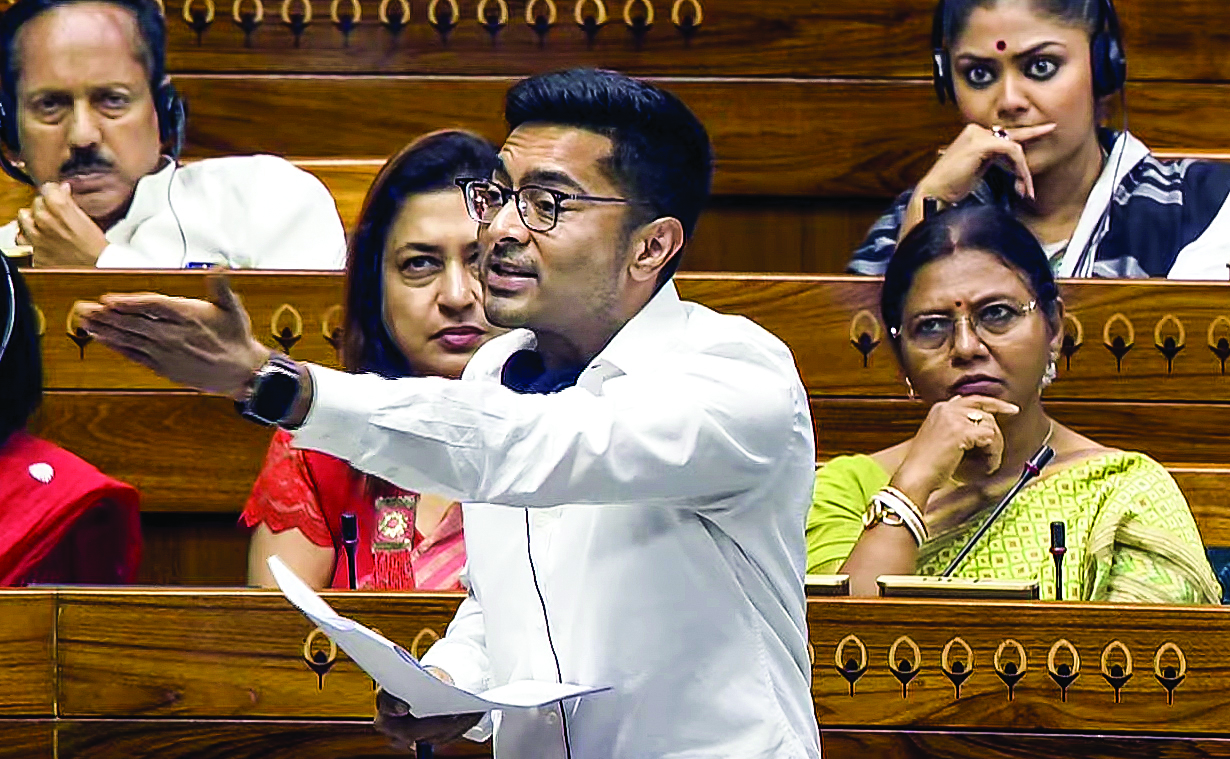The tumultuous debates and pandemonium in Parliament have turned too confrontational.
West Bengal’s young Lok Sabha member who also happens to be the de facto second in command of the state’s ruling Trinamool Congress, illustrated a worrisome future trend in parliamentary discourse. Articulate and presentable, Abhishek in his critical evaluation of the Union Budget 2024, brought in issues unrelated to the topic though he started well by creating his own explanations of the term BUDGET. While concentrating on his written speech Abhishek digressed only to engage with other members and also the Chair on issues extraneous to the budget. The most important point emerging from the speech of a prominent face of the opposition is the shift in parliamentary decorum.
Abhishek Banerjee, “nephew” of West Bengal Chief Minister Mamata Banerjee, did stick to his style of stump oratory meant largely for his party’s “committed” cadres. He ignored the fact that parliamentary proceedings are governed by a different yardstick. He kept throwing challenges to the Chair, other members and even the Finance Minister to engage with him on a media platform. Evidently, he placed media debates at a higher platform than the Lok Sabha debates. This is a new generation of parliamentarian who cares more for cable TV than debates in the law making body of the nation.
In this context one may cite what Nehru said on 14th March 1958 while extending good wishes to the retiring members of Rajya Sabha, “…Legislatures, apart from doing important work, do something. …to set a tone …of conflicting opinions being debated calmly, peacefully and in a friendly way… Stating that “…Parliament does set some kind of an example to the rest of the country”….. “on all of us rests this great responsibility, not only to behave as we should behave, but to remember always that a million eyes are upon us and we may not do something that brings the slightest discredit on Parliament or set a wrong line before the people”. Sadly Abhishek Banerjee and his tribe do not feel Nehru is relevant. Certainly not for them. To them what arouses the cadres – rabble rousing talks factual or not – are good enough even in the house. Times have consigned parliamentary decorum to the wastepaper basket replacing cable TV showmanship with the highest law making body.
The tumultuous debates and pandemonium in the Parliament have turned too confrontational with methods of “fighting”, “squabbling” and “arguing” employed by members to participate in the parliamentary debate. On many occasions they walk around with placards, troop into the well, shout slogans as was seen in the inaugural session of the 18th Lok Sabha when the speech of the Prime Minister, Leader of the House, was continuously interrupted by opposition members.
Clearly, the trend among a section of opposition camp is to arrogantly dismiss the treasury bench and its leaders—a trend that was most pronounced after the electoral victory of Narendra Modi-led NDA. Strangely, opposition members fail to appreciate the simple issue of democracy—people may choose any party or person to represent them in the Lok Sabha. Curiously, some who get elected wear arrogance in their sleeves, as did Abhishek Banerjee. He challenged the chair on issues discussed in the House. The Speaker had to admonish him as a result. That is not all, he even
More than what transpired in the Lok Sabha what is disturbing is how this was captured in mainstream media. Reportedly, Kolkata media flashed the incident as a big triumph for Abhishek Banerjee. Clearly, media did not bother care to report the lack of decorum and observance of parliamentary protocols by the TMC member. For common people who read such media to know the events and have little or no time to watch live telecast of Lok Sabha proceedings, the behaviour of the member will be etched as the new normal. Thus more than the member the so called fourth pillar of democracy, media, has been doing a great disservice to the highest body of democratic institution. Aspiring politicians will also imitate such behaviour taking the democratic process further down.
Take in contrast the attitude of other senior opposition leaders, say Akhilesh Yadav for example. He, too, is critical but there is no arrogance exuding from his body language. Same with many other members from the I.N.D.I Alliance partners. Their speeches and body languages give the impression that arrogance, luckily, is confined among a small section of leaders and their ardent followers. Judged by a large number of such parliamentarians it seems that members like Abhishek Banerjee and his party colleagues are a small percent of the 18th Lok Sabha. What Nehru wrote to the chief ministers on such “most regrettable” discourteous behaviour of members in the House (February 18, 1963) should be remembered by the floor leaders: “It is clear that this kind of thing has to be met effectively; otherwise the work of our Parliament and Assemblies would be made difficult and brought into disrepute. This is a vital matter and I hope Parliament will set a good example which will be followed in the State Assemblies.”
Sugato Hazra is founder of Poliminds Consult, a content agency for aspiring and practising politicians.

